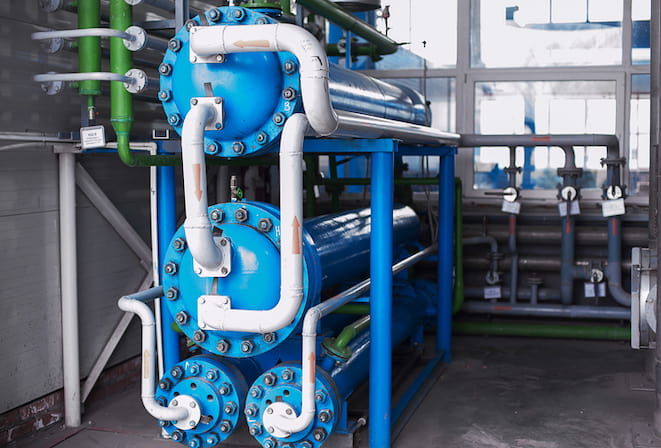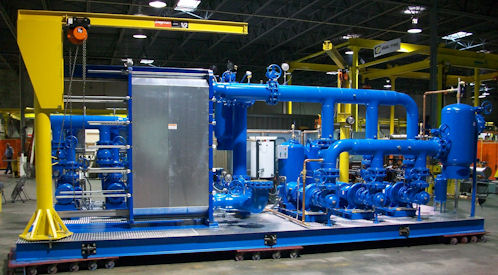Ways to Optimize Thermal Conductivity with DVS Heat Transfer Systems in Extreme Environments
The Role of Heat Transfer Equipments in Sustainable Power Solutions for the Future
Heat transfer systems are necessary in the mission for sustainable energy remedies. They maximize thermal energy monitoring, boosting the performance of eco-friendly modern technologies. By utilizing mechanisms like conduction, radiation, and convection, these systems lessen energy losses. Their duty in solar thermal and geothermal applications is specifically considerable. As innovations arise, the capacity for additional advancements raises vital concerns concerning future energy strategies. What growths will shape the landscape of lasting energy?
Recognizing Heat Transfer Equipments

The Significance of Thermal Power Management
Reliable thermal energy management is essential for maximizing energy efficiency and minimizing waste in different systems. By managing temperature and enhancing Heat transfer processes, companies can markedly lower energy intake and operational prices. Efficient monitoring involves the implementation of sophisticated modern technologies and practices that keep track of and control thermal problems within systems, ensuring that power resources are made use of effectively. On top of that, correct thermal power management adds to lowering greenhouse gas exhausts, aligning with worldwide sustainability goals. It also enhances system dependability and performance, causing boosted item top quality and longer devices life expectancy. Ultimately, focusing on thermal energy administration is a vital action towards developing more lasting power solutions and cultivating a responsible strategy to energy intake in industrial and residential contexts.
Applications of Heat Transfer in Renewable Resource
While numerous renewable resource resources assure sustainability, the effective application of Heat transfer plays a vital function in their efficiency. In wind energy systems, Heat transfer is made use of for generator element cooling, boosting efficiency and longevity. Geothermal energy relies upon efficient Heat exchange in between the planet's subsurface and the fluid circulating in the system, making best use of energy extraction. Biomass energy procedures also gain from Heat transfer, as it aids in converting natural products into useful fuel via pyrolysis and gasification. In addition, in hydropower, keeping optimal temperature levels in reservoirs can boost energy result. Each of these applications shows the important value of Heat transfer systems in enhancing renewable resource modern technologies, eventually adding to an extra sustainable power future.
Enhancing Solar Thermal Power Efficiency
As solar thermal power systems proceed to develop, enhancing their efficiency has actually ended up being vital for maximizing energy output. Breakthroughs in Heat transfer innovations, such as enhanced thermal storage materials and innovative Heat exchangers, play a substantial duty in boosting performance. By utilizing sophisticated products that have exceptional thermal conductivity, systems can capture and transfer Heat more effectively. In addition, incorporating radar that adhere to the sunlight's path guarantees that enthusiasts obtain optimal solar exposure throughout the day. Making use of nanotechnology in solar absorbers can additionally enhance energy absorption rates. In addition, including automatic control systems helps manage temperatures and manage power circulation successfully, leading to decreased losses and enhanced total system performance. These enhancements pave the means for more sustainable solar thermal energy remedies in the future.
Geothermal Home Heating: A Sustainable Solution
Geothermal heating presents a practical choice for lasting power, providing significant environmental benefits via reduced greenhouse gas discharges. Its efficiency and cost-effectiveness make it an appealing choice to traditional furnace. Nonetheless, obstacles connected to application should be resolved to maximize its possible influence.
Ecological Benefits of Geothermal
Traditional heating methods contribute substantially to greenhouse gas emissions, geothermal home heating offers a compelling option that decreases environmental effect. By utilizing the Planet's inner Heat, geothermal systems make use of a renewable resource resource, noticeably reducing reliance on fossil fuels. This approach produces very little carbon discharges, making it a cleaner choice for business and property home heating. In addition, geothermal systems advertise energy efficiency, as they require much less energy contrasted to traditional furnace. DVS Heat Transfer Systems. The use of geothermal energy also aids in minimizing air contamination, improving local air top quality and public health and wellness. As a sustainable remedy, that site geothermal heating sustains environment adjustment reduction initiatives, positioning itself as a crucial element in the change in the direction of a greener future
Effectiveness and Cost-Effectiveness
Exactly how does geothermal home heating measure up in regards to effectiveness and cost-effectiveness contrasted to conventional heating systems? Geothermal heating shows premium performance, commonly accomplishing a coefficient of performance (COP) of 3 to 5, indicating it creates three to 5 units of Heat for every single device of power taken in. This effectiveness equates right into reduced operating prices, particularly in regions with secure geothermal sources. First installment expenses can be more than standard systems; nevertheless, long-term savings on power bills and lowered upkeep costs can offset these ahead of time investments. Additionally, lots of governments incentivize geothermal systems via rebates and tax credit ratings, improving their cost-effectiveness. On the whole, geothermal home heating becomes a financially viable and sustainable alternative to more traditional home heating options.
Implementation Difficulties and Solutions
Numerous challenges can hinder the prevalent application of geothermal furnace, despite their clear benefits as a lasting energy remedy. High preliminary installment costs often discourage capitalists and house owners, making funding a substantial obstacle. In addition, the geographical constraints of appropriate geothermal websites limit access in particular areas. Regional guidelines and allowing processes can additionally make complex project development, causing hold-ups. Additionally, public understanding and understanding of geothermal systems remain reduced, impeding approval. To address these difficulties, targeted education and learning projects can enhance open secret, while federal government rewards could alleviate financial concerns. Working together with neighborhood authorities to enhance guidelines might promote smoother task authorizations, eventually advertising the adoption of geothermal home heating as a sensible, sustainable power choice.
Technologies in Heat Transfer Technologies
Developments in Heat transfer innovations play an essential function in enhancing energy efficiency and sustainability. Advanced Heat exchangers and stage modification products go to the center of these growths, supplying substantial enhancements in thermal management. These technologies not just maximize power usage but additionally add to minimizing environmental influence in numerous applications.
Advanced Heat Exchangers
Advanced Heat exchangers play a vital duty in enhancing energy performance throughout different applications in lasting energy remedies. These gadgets help with the transfer of Heat between 2 or more fluids, considerably decreasing power intake in procedures such as commercial heating, air conditioning, and power generation. Developments in materials and style, such as the usage of nanofluids and portable configurations, have actually led to boosted thermal efficiency and reduced dimension requirements. In addition, developments in digital tracking and control systems permit enhanced procedure, further boosting performance. By minimizing waste Heat and maximizing power recuperation, progressed Heat exchangers add to decrease carbon impacts and support the shift toward ecologically friendly modern technologies. Their continued advancement is vital for accomplishing international power sustainability goals.
Phase Adjustment Products
The integration of phase modification products (PCMs) right into Heat transfer technologies represents a substantial development in energy administration and effectiveness. PCMs take in and release thermal energy throughout their stage adjustments, enabling efficient temperature level regulation in building materials and energy systems. By saving excess Heat during peak periods and releasing it when need boosts, PCMs add to pack changing and power preservation - DVS Heat Transfer Systems. This capacity boosts the performance of renewable resource systems, particularly in solar thermal applications. Furthermore, PCMs can enhance the thermal comfort of interior atmospheres, lowering dependence on traditional home heating and cooling methods. As technologies in PCM formulations continue to arise, their duty in lasting energy services is positioned to expand, supplying encouraging methods for future research study and application

Future Leads for Heat Transfer in Sustainable Power
As the need for sustainable energy services remains to rise, the role of Heat transfer systems is becoming increasingly crucial fit future technologies. Developments in materials and layouts are anticipated to enhance effectiveness in Heat transfer, reducing energy losses in various applications. The integration of advanced thermal storage systems, such as phase change materials and thermochemical storage space, will certainly allow far better monitoring of power sources. Study right into nanofluids and biomimetic Heat exchangers might even more maximize thermal efficiency. The fostering of wise innovations will certainly permit for real-time monitoring and flexible control of Heat read here transfer procedures. These innovations are positioned to substantially add to the total efficiency and sustainability of energy systems, paving the way for a more energy-efficient future.
Frequently Asked Inquiries
Just How Can People Execute Heat Transfer Equipment in your home?

Individuals can carry Your Domain Name out Heat transfer systems in the house by installing energy-efficient devices, utilizing radiant heat, and maximizing insulation. These measures boost energy effectiveness, minimize prices, and advertise sustainable methods in residential atmospheres.

What Are the Costs Connected With Setting Up Heat Transfer Solutions?
The expenses related to setting up Heat transfer systems vary commonly, normally incorporating tools, installment labor, and upkeep. Variables such as system kind, home dimension, and neighborhood laws substantially affect the total expense entailed.
Exist Federal Government Motivations for Heat Transfer System Installations?
Government motivations for Heat transfer system installations differ by region and can consist of tax obligation debts, rebates, and gives. These economic advantages intend to encourage fostering, eventually advertising energy efficiency and lowering ecological effect within neighborhoods.
How Do Heat Transfer Systems Influence Energy Costs?
Heat transfer systems especially influence power expenses by optimizing energy performance. By enhancing the transfer of Heat, these systems lower energy intake, resulting in reduced utility expenses and creating a much more sustainable approach to energy monitoring.
What Upkeep Is Required for Heat Transfer Solutions?
Upkeep for Heat transfer systems includes routine examinations, cleaning of elements, examining liquid levels, guaranteeing correct insulation, and changing used components. These tasks assist keep efficiency, stop break downs, and lengthen the system's operational life-span.
These systems promote the movement of thermal energy from one medium to an additional, allowing the transfer of Heat for energy, heating, or air conditioning generation functions. Geothermal energy relies on efficient Heat exchange between the earth's subsurface and the fluid flowing in the system, making best use of energy extraction. Additionally, geothermal systems promote energy performance, as they call for less power contrasted to conventional home heating systems. Advanced Heat exchangers play a necessary duty in boosting power performance throughout numerous applications in sustainable power options. Heat transfer systems especially influence power bills by optimizing energy efficiency.